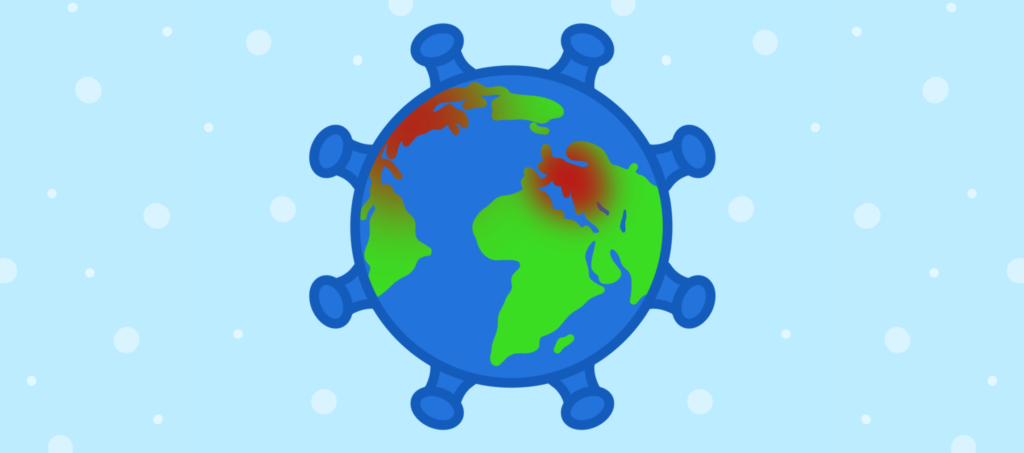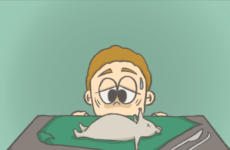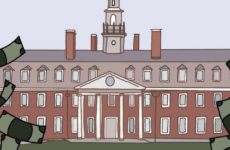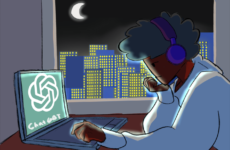“Yeah!” my friends and I shouted as Manchester United, our favorite soccer team, scored a goal. It was Saturday night in Bangkok, and my friends and I were elated, spilling a glass of lemonade on the carpet as we leapt up and cheered. We hugged and laughed as our team took the lead in an intense game against our rival club, Liverpool.
After the match ended, we decided to take a taxi to a nearby mall for dinner. In the small vehicle, I saw cars and buses filling the noisy streets, and pedestrians flooding the narrow sidewalks. At the mall, we decided to eat at our favorite hotpot restaurant. The place was packed, and the rich pork bone soup aroma pervaded the air. Hastily grabbing pieces of meat with our chopsticks and dipping them into our shared pot, we laughed over funny stories of our middle school years. Broth spilled from my nose as we reminisced over a hilarious memory of our field trip to Chiang Mai. I was living life like Covid-19 never existed.

Graphic by Sesame Gaetsaloe/The Choate News
Besides wearing a surgical mask whenever I went outside, life in Thailand was back to normal. With only double-digit daily cases for most of my stay back home, national paranoia was relatively low. I would gather with friends and family throughout the week with Covid-19 far in the back of my mind. I even boarded a plane to southern Thailand, where I enjoyed the warm beaches.
Coming back to Choate during the winter term, I wasn’t prepared for the constant fear I would feel. When I hopped off the plane in New York, my heart began to race — I was in the heart of a Covid-19 hotspot. “This isn’t like back home,” I thought. I had been safe in my Thailand bubble for so long that I forgot the pandemic still existed. Returning to Choate brought back the anxiety I felt during March — the feeling of vulnerability, of mortality, flooded my body.
At the airport, I used hand sanitizer every minute, wore two surgical masks, and even slapped on gloves. Whenever someone walked a little too close to me, I would hold my breath and exhale from my nose so that the virus wouldn’t flow through my nostrils.
Despite having 500 times the number of Covid-19 cases as Thailand, the restrictions in the United States seem to be the same and possibly even looser than I experienced back home. When I traveled back to Thailand last spring, the airport had a body temperature scanner, and the workers wore gloves, masks, face shields, and sometimes even full suits of personal protective equipment (PPE). Although everyone wore masks in New York’s John F. Kennedy International Airport, it was clear that the United States was not taking the virus as seriously as many Asian countries. Myriads of travelers still walked through the terminals, and social distancing still wasn’t apparent.
Combatting Covid-19 goes far beyond finances, resources, and economic power; it also has to do with culture. Having encountered previous viruses, citizens of many Asian countries have learned to comply with government rules for their own safety, and many Asian governments have realized the extent to which one should restrict their cities. When a relatively small outbreak of 500 daily cases occurred in Samut Sakhon province, the whole province went into lockdown. However, in Florida, where more than 200 Covid-related deaths were reported on February 9, 2021, many businesses remain open without mask mandates.
Many Asian countries had a mask-wearing culture before Covid-19. Ever since I was little, my parents would tell me to wear a mask to school whenever I got sick, so I wouldn’t infect others. Even if it was just a slight fever or cough, it was my responsibility to ensure that others stayed healthy. During every flu season, some of my classmates and teachers wore masks to school to protect themselves and others. However, America’s pandemic culture is still developing — and the late start is proving to have fatal consequences.
As I adjust to life back at Choate, I can’t help but to keep one eye trained on the Covid-19 deaths that continue to pile up in the United States. I’ve learned that a culture of mutual responsibility is missing in America, and, if we don’t adjust, we will never recover from the pandemic.




